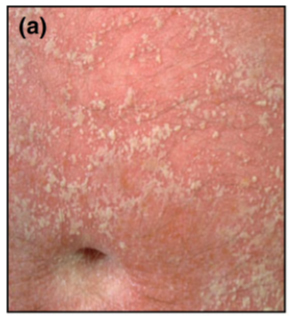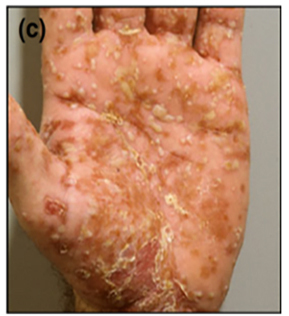Pustular Psoriasis Research Progress
Psoriasis is a chronic, immune-mediated inflammatory disease that affects at least 60 million people worldwide. Psoriasis traditionally comprises both erythrosquamous (involvement of blood vessels and deeper epidermal skin layers) and pustular lesions. Psoriasis has been associated with a number of comorbidities, including among others psoriatic arthritis, anxiety, depression, obesity, metabolic syndrome and cardiovascular disease. Psoriasis is a highly stigmatizing disease that affects patients’ quality of life both physically and mentally, leading in most cases to a high burden.
What is Pustular Psoriasis?
Pustular psoriasis is a rare form of psoriasis, often described as being unpredictable in nature it can flare without warning. This unpredictability can make life for people with the condition very challenging. Plaque psoriasis and pustular psoriasis are distinct from each other both clinically and histologically, but pustules and plaques can sometimes occur together. For example, some pustules have been observed in inflammatory plaques of psoriasis vulgaris (particularly by dermoscopy).
Pustular psoriasis is the term used to refer to two different types of psoriasis with similar names. Palmoplantar Pustulosis, which occurs on the palms of the hands and soles of the feet and Generalised Pustular Psoriasis, which refers to pustular psoriasis across the body.

(a) Generalized pustular psoriasis

(c) Palmoplantar pustulosis
Research on Pustular Psoriasis
Unfortunately, because pustular psoriasis is such a rare condition, the collection of clinical data from a single centre is not possible. Therefore, pooling of clinical data among international centres is crucial to improving our understanding. This pooling of data has historically been difficult to do because the clinical criteria for description and diagnosis of pustular conditions including pustular psoriasis varied widely with no consensus. Furthermore, pooling heterogeneous international groups of patients with non-matching criteria made genetic discovery more difficult. In 2012, a network that would allow a European consensus for the clinical criteria of pustular psoriasis was conceived. This project, originally named the European Rare and Severe Psoriasis Expert Network (ERASPEN), allowed clinicians to include patient information in a static registry, based on a one-time clinical characterisation of pustular psoriasis patients in Europe. This started an unbiased collaborative investigation of the clinical phenotype and genotype of pustular psoriasis patients. Pustular psoriasis is rare and often difficult to treat but we hope that further research will contribute to better understanding and better treatment options for people with the condition.
In 2018, the project became international and is now called the International Rare and Severe Psoriasis Expert Network (IRASPEN).

The IRASPEN-Registry is a global, prospective registry, investigating the genotype-phenotype correlation of pustular psoriasis. IRASPEN comprises the prospective collection of data and biological material from multiple, global sites: https://www.iraspen.org/
The sub study IRASPEN-CS is a cross-sectional design comprising a one-time collection of data and photographs, based on the first visit of the IRASPEN main project.
What are the objectives of the registry?
-
To give insight on the natural course of disease in pustular psoriasis, namely reveal the burden of disease including frequency and severity of flares
-
To reveal the need and efficacy of therapeutic interventions
-
To reveal further genetic causes of pustular psoriasis
-
To describe transcriptional profiles, correlating with subtypes and severity of disease
PD Dr Maul is keen for all GPA Regional Coordinators and dermatologists from around the world to contribute to the study. The electronic case report form, information on ethical approval and reimbursement for the study can be provided on request. For further information, please contact: Julia-Tatjana.Maul@usz.ch
Where can I go for further information on pustular psoriasis?
Further information about pustular psoriasis is available from the National Psoriasis Foundation: Understanding Pustular Psoriasis: National Psoriasis Foundation and the Psoriasis Association: Pustular Psoriasis (psoriasis-association.org.uk).
Find more information on IRASPEN here: https://www.iraspen.org/
